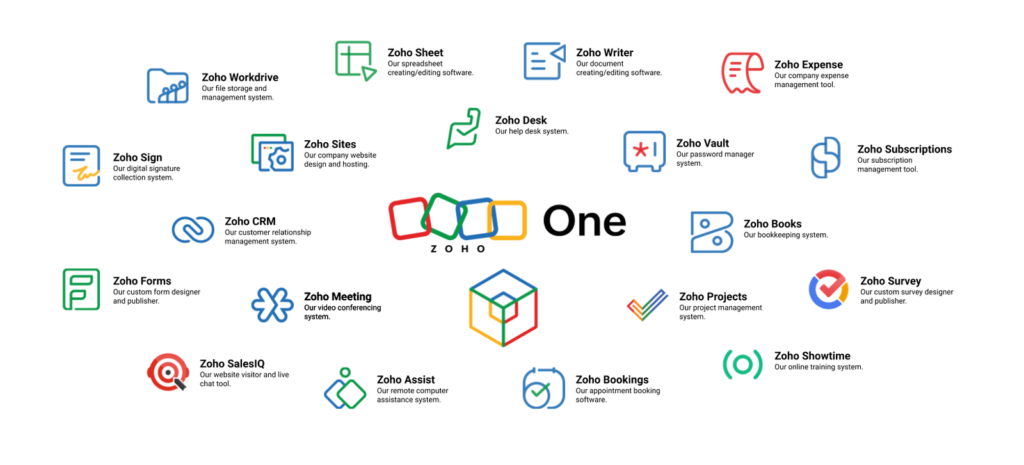- Small Business Technology: How Technological Innovations Have Benefitted SMEs
- The Evolution of Small Business Technology
- How important is technology for Small Businesses?
- Adapting to Change: benefits of technology in business
- The Role of Technological Innovations in Small Business Growth
- Navigating Industry-Specific Needs
- Looking to the Future: Business Automation with Zoho
- Embracing the Future with Small Business Technology
Small Business Technology: How Technological Innovations Have Benefitted SMEs
Facebook Youtube LinkedinIn the dynamic landscape of modern business, technology has emerged as a powerful catalyst for transformation, reshaping the way small and medium-sized enterprises (SMEs) operate and thrive. The relentless march of technological innovations has brought forth a wave of opportunities, empowering small businesses to streamline operations, enhance efficiency, and navigate the competitive terrain. This article delves into the world of small business technology, unraveling the profound ways in which technological advancements have become a cornerstone for the success of SMEs.
The Evolution of Small Business Technology
The journey of small businesses intertwining with technology is a fascinating evolution. From the basic adoption of computers to the present era of cloud computing, artificial intelligence, and seamless integrations, technology changes business ground up and has helped small businesses travel a remarkable distance. Understanding this evolution provides a context for appreciating the significance of contemporary technological solutions.
From Brick-and-Mortar to the Cloud
Historically, small businesses were confined to local markets, limited by physical storefronts and traditional marketing methods. The advent of the internet marked a pivotal moment, enabling small businesses to establish an online presence and reach a broader audience. This shift laid the groundwork for the digital transformation that continues to unfold today.
Rise of Cloud Computing
The evolution of technology saw a paradigm shift with the rise of cloud computing. Small businesses, once burdened by the costs of maintaining physical servers, could now leverage cloud-based solutions. This not only reduced infrastructure costs but also provided the scalability necessary for growing enterprises.
How important is technology for Small Businesses?
A. Efficiency and Streamlined Operations
One of the primary benefits of technological integration is the enhancement of operational efficiency. Small businesses, often operating with limited resources, find comfort in the multifunctionality offered by modern software solutions. These tools consolidate various business functions under a unified platform, allowing for streamlined operations and resource optimization.
B. Cost-Effective Solutions
Technological innovations have democratically opened the doors for small businesses to access cost-effective solutions. Cloud-based applications, in particular, eliminate the need for substantial upfront investments in hardware and infrastructure. This democratization of technology ensures that even businesses with modest budgets can harness the power of advanced tools.
C. Market Reach and Globalization
The advent of the internet and online platforms has destroyed geographical barriers for small businesses. E-commerce, social media marketing, and online business application / tools enable SMEs to reach a global audience without the need for an extensive physical presence. Technology has, in essence, fueled the globalization of small businesses.
Adapting to Change: benefits of technology in business
In the fast-paced business landscape, adaptability is synonymous with survival. Small businesses that embrace technological innovations position themselves as competitive players in their respective industries. Failure to adapt may result in falling behind, missing out on opportunities, and losing market relevance.
Why it is Important to Adopt the Latest Trends of Technology?
The importance of adopting new technology in business cannot be overstated. Small businesses that stay side by side of emerging technologies position themselves as early adopters, gaining a competitive edge. Whether it's the integration of artificial intelligence or the utilization of cutting-edge marketing apps, staying ahead of the curve is a strategic imperative.
The Role of Technological Innovations in Small Business Growth
The toolkit for small business technology adoption includes indispensable applications. Customer Relationship Management (CRM) software, marketing tools, financial applications, and operational tools like project management systems form the nucleus of these applications. These versatile tools cater to the diverse needs of small businesses, providing a comprehensive foundation for growth.
Artificial Intelligence as a Game-Changer
The advent of Artificial Intelligence has ushered in a new era for small businesses. Leveraging AI in customer support processes, sales, marketing, and data analysis has become a game-changer. There are lot of Small business Applications as, they can now automate support services, analyze customer behavior, and derive valuable insights from data, fostering informed decision-making.
Navigating Industry-Specific Needs
A. Custom Solutions for Unique Requirements
While many platforms offer a plethora of applications, small businesses may have industry-specific needs that demand unique solutions. The challenge lies in finding custom applications or platforms that seamlessly integrate with existing systems. This bespoke approach ensures that technological solutions align with the specific requirements of the business.
B. Government Support for Technological Adoption
Recognizing the significance of technology in small business growth, governments often extend support programs. In Canada, for instance, programs CDAP and DMAP assist businesses in evaluating digital transformation options, understanding the financial implications, and planning for successful implementation. This governmental support acts as a catalyst for small businesses looking to embrace technological advancements.
Looking to the Future: Business Automation with Zoho

Zoho as a Catalyst for Digital Transformation
In the competitive realm of business automation, Zoho stands out as a comprehensive suite of applications. Companies like Customerization specialize in setting up Zoho for businesses, facilitating digital transformation through efficient business automation. Small businesses keen on scaling in the digital era can leverage the expertise of a Zoho authorized partner company, unlocking their business potential.
Scaling Operations with Zoho
The integration of Zoho into small business operations brings forth a myriad of benefits. From CRM functionalities that enhance customer relationships to project management tools that streamline workflows, Zoho offers a holistic approach to business automation, they provides a ton of Apps to manage Small Business. This not only saves time and resources but also ensures a more synchronized and efficient business ecosystem.
Embracing the Future with Small Business Technology
In conclusion, small business technology has evolved from being a luxury to a strategic necessity. The transformative power of technological innovations has empowered small businesses to compete, adapt, and thrive in an ever-changing landscape. From cost-effective solutions to global market reach, technological adoption has become synonymous with progress. As SMEs continue to navigate the complexities of modern business, the seamless integration of technology remains a guiding light, unlocking new possibilities and propelling small businesses towards a future defined by innovation and efficiency.
Check out Customerization Co-Founder & CTO Talk about Kickstarting Tech in SMB’s.
If you’re going ahead with Zoho, make sure you reach out to us for better understanding how to do it with maximum efficiency. Happy to help! - Talk with Customerization Team.
Contact Us




